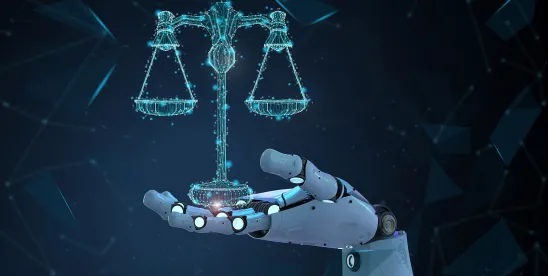- On July 31, 2024, the Senate Commerce Committee advanced 10 AI-related bills for consideration in the full Senate.
- The bills touch on nearly every facet of the AI ecosystem, from AI standards and requirements to AI development and research programs and a ban on certain AI-generated deepfakes.
- The bills were advanced right before the Senate adjourned for August recess, making the likelihood of their passage during an election year very slim, but Senator Schumer has openly discussed opportunities to pass AI bills in September and December.
On July 31, 2024, the Senate Committee on Commerce, Science, and Transportation advanced, with bipartisan support, 10 AI bills that touch on nearly every facet of the AI ecosystem. The bills authorize several agencies to create standards and requirements for safe AI use and promote AI research and development, launch a national AI research resource, criminalize non-consensual intimate imagery (NCII) generated by AI, and foster public awareness of AI.
Because the bills were advanced right before the Senate’s August recess during an election year, the Senate, and certainly the House, have minimal time left to pass any of these bills, making their passage unlikely this Congress. The scenario Senator Schumer probably has in mind is to attach AI provisions to must-pass, end-of-the-year legislation. Below we summarize the key provisions of the 10 bills.
Commerce Committee Advances 10 AI Bills
The Commerce Committee advanced the 10 following AI bills:
- Future of Artificial Intelligence Innovation Act of 2024
- The Future of AI Innovation Act would establish the Artificial Intelligence Safety Institute, which would create voluntary standards and guidelines for AI and research AI model safety and issues. The Institute would also create a test program for vendors of foundation models to test their models “across a range of modalities.” The bill would also direct the National Institute of Standards and Technology (NIST) and the Department of Energy to establish a testbed for the discovery of new materials for AI systems.
- CREATE AI Act of 2023
- The Creating Resources for Every American to Experiment with Artificial Intelligence Act (CREATE AI) of 2023 would establish the National Artificial Intelligence Research Resource, a resource infrastructure that would “advance the development of safe, reliable, and trustworthy artificial intelligence research and development” and expand access to AI resources for students and researchers.
- NSF AI Education Act of 2024
- The National Science Foundation (NSF) AI Education Act would strengthen AI education and the workforce by creating scholarships for AI research and development for undergraduate and graduate students, as well as AI research grants and awards and centers of AI at community colleges and vocational schools. The bill would also require that within two years, the director of the National Science Foundation must create guidelines for educating elementary and secondary school students about AI.
- Validation and Evaluation for Trustworthy (VET) Artificial Intelligence Act
- The VET Artificial Intelligence Act would require the director of the NIST to develop “voluntary guidelines and specifications for internal” and external artificial intelligence assurance, which is the impartial evaluation of an AI model by a third party to identify errors in the functioning and testing of the model and verify claims about the model’s functionality.
- The Small Business Artificial Intelligence Training Act of 2024
- The bill would direct the Department of Commerce and Small Business Administration (SBA) to develop and distribute training materials on AI for small businesses.
- Promoting United States Leadership in Standards Act of 2024
- The bill would task the director of NIST to brief Congress on opportunities for the federal government to support industry “in the development of technical standards for artificial intelligence,” establish a web portal to inform industry about existing efforts to develop technical standards for AI, and launch a pilot program to “support stakeholder meetings in the U.S. on developing such standards.”
- TEST AI Act of 2023
- The bill would strengthen interagency coordination on AI by requiring the director of the NIST and the Secretaries of Commerce and Energy to establish testbeds “to support the development and testing of artificial intelligence systems.” The bill would also require the Secretary of Commerce and Secretary of Energy to enter into a memorandum of understanding outlining the scope of their collaboration around AI innovation, trustworthiness, and testbeds.
- Artificial Intelligence Research, Innovation, and Accountability Act of 2023
- Regarding research and innovation, the Artificial Intelligence Research, Innovation, and Accountability Act (AIRIA) would direct the Secretary of Commerce to conduct research on “content provenance and authentication for human and AI-generated works” and the Comptroller General to study “statutory, regulatory, and policy barriers to the use of AI” within the federal government. Regarding accountability, the bill would also create standardized definitions of common AI terms; transparency requirements for AI use, including disclosures that content is AI-generated; and disclosure and reporting obligations for high-impact AI systems, including those involved in making decisions related to housing, employment, credit, education, health care, or insurance, among other requirements.
- TAKE IT DOWN Act
- The Tools to Address Known Exploitation by Immobilizing Technological Deepfakes on Websites and Networks Act, known as the TAKE IT DOWN Act, would criminalize the publication non-consensual intimate imagery, including certain AI-generated deepfakes, and also require social media platforms to establish processes by which they remove such content from their platforms.
- Artificial Intelligence Public Awareness and Education Campaign Act
- The bill would direct the Secretary of Commerce to “conduct a public awareness and education campaign to provide information regarding the benefits of, risks relating to, and the prevalence of artificial intelligence in the daily lives of individuals in the United States.”
The Clock Is Ticking for This Congress to Act on AI
For those who believe that AI moves too fast and Congress moves too slowly to effectively address the issues posed by AI in a number of areas, the lack of urgency demonstrated by the pace of Congression action provides ammunition to that position. Moreover, of the 10 bills advanced, only one — the Take It Down Act would actually make a change in substantive law. The other statutes authorize studies, coordination, and training materials, deferring any substantive legislative response.
Senator Schumer (D-NY) has suggested possible opportunities to pass other AI legislation in September and December. According to Schumer, AI Deepfake election bills, which we wrote about in June, may be added to a funding bill that must pass by the end of September, while AI legislation may also be included in the defense policy bill that must be passed by the end of December. Regardless, the clock is ticking for the Senate to pass AI legislation during this Congress.






 />i
/>i

